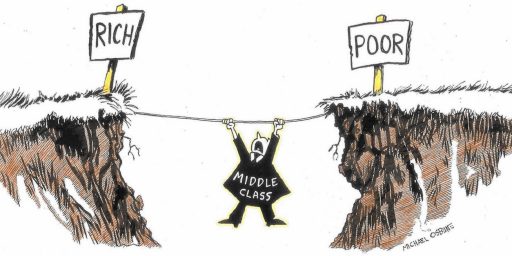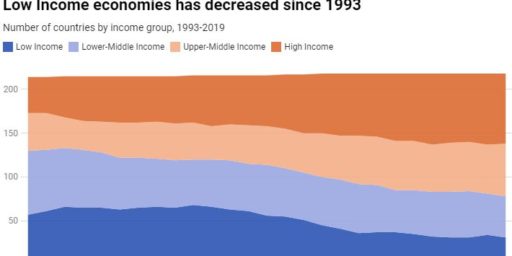WORK PAYS!
Thomas Sowell is tired of hearing about “the rich”.
Despite the looseness with which the term “rich” is thrown around — as in “tax cuts for the rich” — most people to whom that term is sweepingly applied are far from being rich. First of all, whether you are rich or not depends on your wealth, not your income, but the statistics used by the envy zealots are almost always income statistics.
These are also usually statistics about family income or household income, which can be very misleading, because families and households differ substantially in size — and where there are more people making money, they usually make more money.
While there are more than 19 million people working in households with incomes in the top 20 percent, there are fewer than 8 million people working in households in the bottom 20 percent. How much of an injustice is it that people who work get more money than people who don’t work?
If you are talking about working full-time, 50 or more weeks a year, then there are more people doing that in the top 5 percent of households than in the bottom 20 percent. As Casey Stengel used to say, you can look it up. These are Census data, available on-line from the Current Population Survey, Table HINC-06.
It may not be a breakthrough on the frontiers of economics to say that work pays, but it does. Among households in the bottom 20 percent in income, there are more than 13 million people who do not work at all and fewer than 8 million who do work, counting both full time and part time workers.
How do people live without working? Millions in the bottom 20 percent live on the money earned by other people who do work and whose income gets taxed to pay for the non-workers. In addition, more than 4 million families in the bottom fifth in income live on property income and nearly 6 million live on various forms of retirement income, including Social Security. (Table FINC-06, for those who demand proof only from those they disagree with.)
What about those “rich” people we hear so much about? Studies that follow the same individuals over time have found that those in the top 20 percent and those in the bottom 20 percent are mostly the same people at different stages of their lives. Not only does work pay, when you have worked a longer time, it usually pays more.
Shocking. Obviously, the correlation between work and income is far from perfect. Clearly, there are a handful of people who get rich without working particularly hard–inheriters and celebrities, mainly. And by celebrities, I mostly mean certain actors, especially those who seem to have no talent other than looking good in little or no clothing, and singers/rappers who make a quick buck on a hit single and go away. There’s no doubt about it: some people get lucky–right place, right time.
With almost no exceptions, pro athletes work their tails off for the most part, putting in an amount of time and effort that few of us can imagine. Even most singers and actors work at their craft for years for no money, usually working a demanding and low paying side job until they can support themselves–or just give up before they succeed. There are an amazing number of great singers and wonderful actors doing community theater who will never get their big chance. Those occupations are very high risk, high reward.
Most entrepreneurs, physicians, attorneys, and similar high earners put in ridiculous amounts of time working. Bill Gates is filthy stinking rich, but he probably puts in more hours a week than any of us complaining about his wealth. Plus, most of those people sacrifice earning power early on while in school or building their businesses. It’s reasonable, and good for society, to incentivize that behavior.
I’m not saying, by the way, that going to school a long time means you’ll make big money. Very few of us with a social science Ph.D. are making the big bucks! And getting a doctorate takes longer than law school and nearly as long as medical school, although at a much lower rate of pressure than the latter. So, why don’t we make a ton of money? Supply and demand, basically. Most people go to graduate school because they enjoy the subject they’re studying. A vast number want to go on to be professors, a job that looks very glamorous and easy and, compared to a lot of things, is. Summers off. Great hours. Flexible schedules. (Yeah, you have to grade papers and do research and all sorts of other crap to get tenure. Sshhh.) But the bottom line is there are too many of us chasing too few jobs which means the employers can exploit us. Indeed, there are a ridiculous number out there working at near-poverty wages because of a bizarre job market for us.
Physicians have precluded this fate by creating artificial scarcity. The AMA has managed to take control of the medical schools and put ridiculously small caps on the number of people who can get into them, so they turn away a phenomenal number of highly-qualified applicants to keep the pool small. Lawyers are a different ballgame entirely. There are far more of them per capita in the US compared with any other society, but they can essentially create their own work through generating lawsuits, plus we live in a ridiculously overregulated society so we need lawyers for even mundane tasks.
I’ll stop now before this assumes Den Bestian length . . .
(Hat tip: Bill Quick)






Last I counted, there were 27 lawyers in this town of 4600. And about three plumbers. The plumbers make more money.
Heh. Yeah–I’m too tired to think of all the contingencies. My short answer: Now that everybody HAS to go to college, regardless of their aptitude, people who can actually do real jobs like that are in ridiculously short supply.
Nobody has the energy to tackle that one. It’s plain crazy.
You forgot the other way lawyers generate work for themselves: getting elected to office so they can write more laws.
I think you should have posted the Thomas Sowell piece as part of the Jesse Jackson piece to juxtapose the differences in “black leadership” between these 2 men. I find it very sad that Sowell, a true intellectual, is considered an “uncle tom” in the black community, while Jesse Jackson is admired.
I usually just post stuff as I come across things; I found Sowell last night and, while checking Bama sports news, came across the Jackson thing this morning. It is an interesting contrast, though.
—